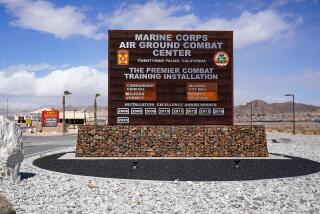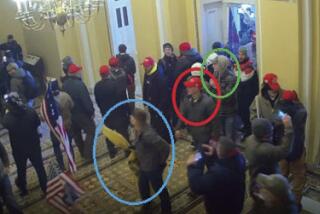New Marine Commandant Is ‘Right Guy at Right Time’ : Military: Friends say Lt. Gen. Carl E. Mundy Jr. may be one of the most affable men ever selected for the post.
ANAHEIM — Carl Mundy knew he wanted to be a Marine the day he saw the movie “Wake Island” starring William Bendix, a World War II film about the struggle of a group of Marines trying to hold an American base on a small Pacific Island. Young Carl was taken by the uniforms, the helmets and the weapons.
Last month, Lt. Gen. Carl E. Mundy Jr. was given the highest honor of his 34-year career when President Bush named him as Marine Corps commandant, replacing Gen. Alfred M. Gray, whose term ends July 1.
Mundy, 55, who has a phenomenal memory, is considered one of the most articulate, intelligent and polished Marines in the corps. His friends say he may be one of the most affable men ever selected as commandant. The Senate is expected to confirm Mundy later this month, during which he will receive his fourth general’s star.
Mundy’s predecessor was known as a tough-talking, tobacco-chewing general who wanted to return to the basics. But insiders say the changing times now call for someone like Mundy, who can deal with a corps stung by rapidly shrinking budgets and a renewed rivalry among the services in the wake of the Persian Gulf War. It is a time when artful negotiations and an ability to listen may mean the difference between success or failure.
“We have been blessed to have him (Mundy) coming up now,” said Maj. Gen. Donald E.P. Miller, a former wing commander at the El Toro Marine Corps Air Station who recently retired after 35 years in the corps. “Marines have always had the propensity to bring up the right guy and at the right time.”
After an appearance last week at a Navy League meeting in Anaheim, the lean, square-jawed Mundy discussed with The Times a wide range of issues facing the Marines, including women in combat and the need for new helicopters and other equipment in an era of tight budgets and cutbacks.
And, although he declined specific comment on a scandal at the El Toro base over the use of military aircraft for personal trips, Mundy remarked that ranking military officers always should avoid any action, however right or legal, that could be misinterpreted or give the appearance of wrongdoing.
Since the Persian Gulf deployment, the public’s resistance to women in combat appears to be waning. According to the Defense Department, 13 uniformed women died in the Gulf, five in combat and eight in accidents.
Nearly two weeks ago, the House voted 268 to 161 to approve a military budget bill that included a provision repealing restrictions on women flying combat aircraft. The Senate will take up the issue later this summer. If approved by Congress and signed into law, it would be up to each service to implement the law and to decide how far to expand the roles of women.
Women do not now fly in the Marine Corps because virtually all pilot and crew member slots are classified as combat jobs.
Questioned about the policy, Mundy said women could fly Marine fighter jets and helicopters in combat as well as men, but his concern is “opening the door” to the whole issue of women in combat. He praised those women Marines who served in the Persian Gulf War, many of whom were put in harm’s way.
“There is a very distinct difference between personal hand-to-hand combat and being exposed to danger, being under fire, being threatened, and even perhaps being shot down and captured,” Mundy said.
“Personal combat means closing with and killing, sometimes violently, and sometimes in the most debasing of all human forms. It is not a pleasant thing to do,” Mundy said. “It is not a thing I think women are oriented to do, and I’m not sure as a civilized people we want to raise women to do that sort of thing . . . that is, to fight those very personal, close combat battles.”
Mundy said he will ensure that women share in the opportunities for upward mobility and good assignments. “I am an advocate of women in the military because the women with whom I have been associated have generally done superbly,” he said.
But before taking dramatic steps to change traditional roles in the military, he said, “we should ask the question: Why are we doing it?”
“We should not presume that an experience is necessarily a lesson learned,” he said of the Persian Gulf War. “Experience under fire is not the same as closing with and killing an enemy.”
Appearing equally at ease whether giving a speech to a full auditorium, testifying before Congress or doing a one-on-one interview with a reporter, Mundy, the father of two sons, both of them officers in the Marine Corps, said the aging fleet of CH-46 Sea Knight helicopters stationed at the Tustin Marine Corps Air Station and on the East Coast needs to be replaced. He likened the troop carrier to a 1965 Chevy--a nice automobile to drive around but expensive to keep in good running order.
A few years ago, the revolutionary, V-22 Osprey, an aircraft that takes off and lands like a helicopter and flies like an airplane by rotating its engines, was destined to become the Marine Corps’ cornerstone troop carrier, replacing the CH-46. But Defense Secretary Dick Cheney, faced with deep budget cuts, said the Osprey was too expensive.
Mundy said he understands the budget constraints that Cheney is working under.
“We need something to replace the CH-46,” Mundy said. “We are going to look at affordable alternatives.”
Mundy declined to speak directly about the scandal that rocked the El Toro air station earlier this year. An investigation into the improper use of Marine aircraft for personal golfing trips led to the suicide of Col. James E. Sabow and the firing by Brig. Gen. Wayne T. Adams of his chief of staff, Col. Joseph Underwood.
That same issue, the use of military C-12 aircraft for personal use, finally led to an investigation of Adams and his reassignment from commanding general of El Toro and other western Marine air bases to unspecified duties at Quantico, Va.
“I don’t know what the final investigation will reveal,” Mundy said, adding that it would not be fair to comment on something that is still under investigation.
Officers in the military, especially high-ranking ones, have to be particularly aware of their actions, Mundy explained. Even though those actions are proper and legal, they may still have the appearance of being improper.
“If it can be misinterpreted, it will be misinterpreted,” the general said. “I think you have to be very careful.”
Mundy, now the commanding officer of the sprawling U.S. Atlantic Marine Fleet Force in Norfolk, Va., has spent 34 years in the Marine Corps since his graduation from Alabama’s Auburn University. He is scheduled to become the 30th Marine commandant, following in the steps of Gens. P.X. Kelley, Louis H. Wilson and Robert H. Barrow, all past Marine commandants.
Born in Atlanta, Mundy was an only child. His father, Carl Mundy Sr., spent a lot of time with his young son, telling him often that there were few callings as admirable as being a Marine.
He enrolled in Army ROTC in college and, after graduation, entered Marine Corps officer training school. That same year, 1957, he married his high school sweetheart, Linda Sloan.
In 1966 and 1967, Mundy served in Vietnam as operations and executive officer in the 3rd Battalion, 26th Marines, 3rd Division and later as an intelligence officer in the headquarters of the 3rd Marine Amphibious Force.
He was wounded when a mortar shell hit his camp near Khe Sanh, suffering what he described as a minor leg wound.
Mundy won a Purple Heart medal to go along with a Legion of Merit, Bronze Star, two Navy commendation medals and the Vietnamese Cross of Gallantry.
“He is straight up and down,” said John M. Rau of Orange, a past president of the Navy League of the United States and a longtime friend of Mundy. “He is very much a people’s person and will always find time to talk to his driver or the sentry at the gate. He has a presence. There is never a question about who is in charge.”
That presence is due in part to the lean appearance of Mundy, who is about to turn 56. He runs, walks or takes his lunch hour in the gymnasium almost daily. Navy League President Calvin Cobb Jr. summed it up when he said Mundy has gained 5 pounds since he first met him in 1960.
Because the Persian Gulf War fell under the primary responsibility of Pacific Fleet Marines on the West Coast, Mundy missed the call to the battlefield.
His older son, Carl III, an officer at Camp Pendleton, did not go either, but his other son, Tim, a Marine lieutenant, was shipped to the Gulf.
How did that feel?
“It is a hell of a thing to send your youngest,” he said. “I felt like a real wimp.”


